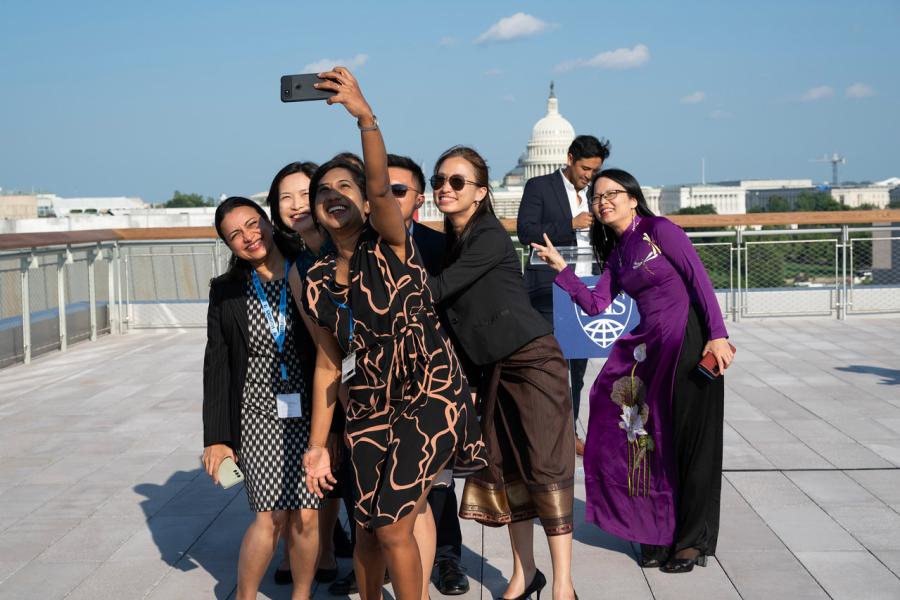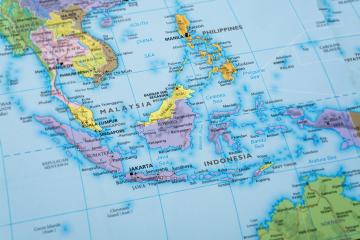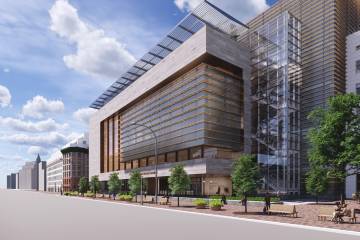It was the very first event at 555 Pennsylvania Ave. NW, the new home of Johns Hopkins University's School of Advanced International Studies in Washington, D.C.. Faculty and staff were just getting ready to move in, and the arrival of SAIS students for their first semester in the new building was still two weeks away.
For everyone gathered on a rooftop terrace of the building on Aug. 8 at the welcome reception for the first group of fellows in the U.S.-ASEAN Institute for Rising Leaders program, the special significance of the connection between the event's purpose and its venue was top of mind.
"We're really grateful and honored to have Jon as the first speaker in our new building," said SAIS Dean James B. Steinberg as he introduced Jon Finer, President Biden's principal deputy national security adviser.
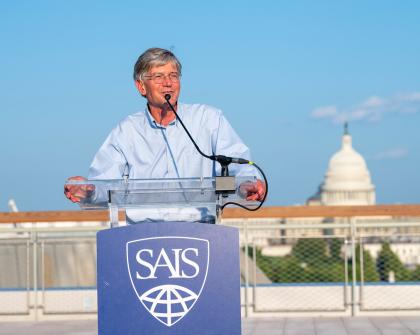
Image caption: SAIS Dean James B. Steinberg speaks during a U.S.-ASEAN Institute for Rising Leaders event at JHU's new building at 555 Pennsylvania Ave. NW in Washington, D.C.
The U.S.-ASEAN Institute for Rising Leaders was first announced by the White House in May 2022 during a special summit held to strengthen diplomatic relations between the United States and the 10 member states of the Association of Southeast Asian Nations, or ASEAN: Brunei, Cambodia, Indonesia, Laos, Malaysia, Myanmar, The Philippines, Singapore, Thailand, and Vietnam. Johns Hopkins SAIS led the newly created institute for mid-career public service professionals, which was organized as a public-private partnership with the State Department and generously funded by private-sector donors.
Joshua White, a SAIS professor who was named director of the program, spearheaded a year of intense work to get the U.S.-ASEAN Institute for Rising Leaders up and running. White and his team put together a schedule designed to sharpen the participants' academic and policymaking skills. The first cohort of 31 fellows started in the program on July 31, just before the SAIS community began to move into the new building.
At the Aug. 8 reception, Finer, the National Security Council official, emphasized the U.S. commitment to ASEAN centrality and support for the ASEAN outlook on an Indo-Pacific region that remains free and open, connected, prosperous, secure, and resilient. One of the best ways to support this vision, he said, is by engaging with the next generation of ASEAN leaders through people-to-people programs such as the Institute for Rising Leaders.
"I began my career in government in a fellowship program, not unlike this one," Finer noted. "I found it incredibly meaningful and consequential here in Washington, D.C. And in the weeks and years ahead, I hope you will keep up this connection and know that the United States will be with you every step of the way."
Many of the 31 fellows in the inaugural cohort of the U.S.-ASEAN Institute for Rising Leaders cited the opportunity to make lasting connections—not only with people based in the U.S., but also with one another—as one of the best parts of their experience. Their busy schedule included multiple visits with key players in public and private sector institutions: among them the State Department, the White House, the Coast Guard, the U.S. Mission at the United Nations, the World Bank, Google and Visa's offices in New York, as well as Washington, D.C.-based think tanks.
"This fellowship program has exceeded all my expectations," said Kristin Samivelu, a senior manager in Singapore's Ministry of Communications and Information. "Not only did I get an opportunity to hear about U.S. perspectives on issues related to technology, health, energy, and climate, but I also walk away knowing the views of fellow ASEAN members."
Phanith Vun, who works as a bureau chief in information research and analysis at Cambodia's Ministry of Foreign Affairs, said the Rising Leaders fellowship has contributed to the soft skills he intends to apply in his professional life. But he also pointed out the fun parts of the experience. "I also liked the boat cruises in New York that offered stunning views of the city's landmarks, such as the Statue of Liberty, the Brooklyn Bridge, the Manhattan skyline, and more," Vun said.
"This is the best international training program I have attended in my entire career," said Tran Duc Vinh, head of the South Asia Division in Vietnam's Ministry of Foreign Affairs. "I found my interests addressed in all the discussion and classroom sessions, and I am grateful for that."
As the inaugural cohort of fellows in the U.S.-ASEAN Institute for Rising Leaders were departing the U.S. to head back home, the initial stages of planning were already beginning for the next group of fellows, who will arrive in 2024.
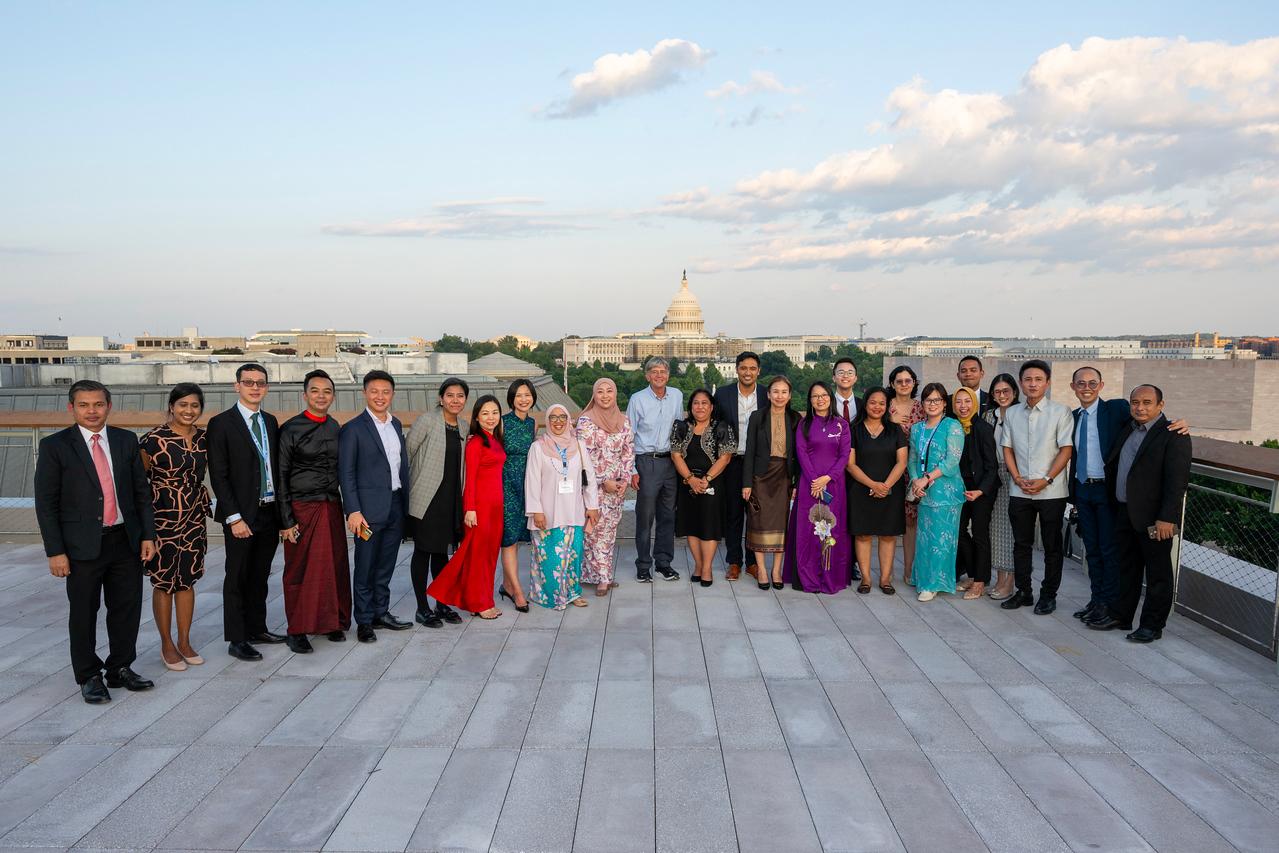
Image caption: The inaugural cohort of the U.S.-ASEAN Institute for Rising Leaders gathered Aug. 8 for an event at Johns Hopkins University's new building at 555 Pennsylvania Ave. NW in Washington, D.C.
Posted in University News, Politics+Society




